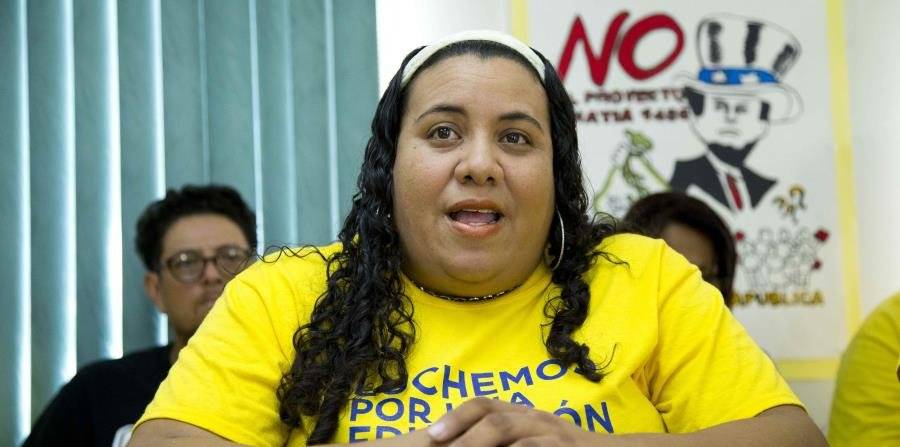

Mercedes Martínez Padilla, president of the Federación de Maestros de Puerto Rico.
The Puerto Rico Teachers Federation (FMPR) held a successful one-day strike March 19 against legislative attacks on teachers and students. FMPR has been in the vanguard of the class struggle for decades. The FMPR is working tirelessly to provide hurricane relief in the absence of U.S. government assistance.
On April 8, FMPR President Mercedes Martínez addressed the 3,000-plus unionists and activists attending the Labor Notes conference in Chicago. Workers World contributing editor Martha Grevatt interviewed President Martínez and Vice President Edwin Morales.
Martha Grevatt: Tell us about the history of the FMPR.
Mercedes Martínez: We were founded in 1966. Teachers were upset with the Association of Puerto Rican Teachers (AMPR), the AFL-CI0 affiliate. It was a bosses’ union, not a class-struggle union. Puerto Rican teachers needed a union that fought for them. Teachers tried to change the union, believing that teachers are workers and deserve the right to bargain, negotiate, protest and strike to better their interests. At that time, the school bosses were in the same association as teachers. We needed an association of only teachers. The AMPR was like a ministry, saying you have to sacrifice and not protest.
We had a 30-day strike in 1974. At that time, the class struggle was in a process of mobilization, with 1,400 strikes in one year. The first strike was by the FMPR, as a rank-and-file union linked to anti-imperialist political organizations. The union was trying to transform the teacher sector.
MG: How has the FMPR been fighting austerity?
MM: We have been resisting in a lot of ways, with organizational work and giving communities a political context of why it is happening. To build a country we want to live in, it is not just being against charter schools, privatization and layoffs, but for a mass mobilization of the community.
Our union has been in the front lines for many years. When the capitalist colonial crisis got worse in 2006, bosses started eliminating rights and destroying contracts. In 2008, we went on strike when there was a deficit and the government shut down. Teachers were fired and a sales tax was imposed. This was to accelerate the neoliberal agenda. But the strike stopped charter schools.
Law 35 prohibits strikes. FMPR was decertified in 2008 [even before the strike], but members had decided to go forward with the strike because the rights of workers were more important. FMPR was an instrument of fighting.
We were recertified in 2009. We had a strike in 2011 and were decertified again. [The board] could not collect dues and the executive board was fired. We worked for a year without a salary. We were recertified again in 2013.
FMPR has continued fighting. We have faced the repression of the state, but we have the respect of the Puerto Rican people.
MG: What has been the union’s response to the hurricanes?
Edwin Morales: Irma was just devastating to us: our own individual losses — family, community, schools — a huge panorama. Solidarity was the saving part. People from all over came, many union activists. We handed out $525,000 to school workers. We rebuilt schools and homes, reopened roads, provided food and shelter, and organized against school closures.
MG: Tell us about the recent strike and upcoming struggles.
MM: The [one-day] strike was held March 19 by 60,000 teachers. Of the students, 90 percent were absent. We announced the strike on a Wednesday and struck Monday. We pre-organized. We gave talks in communities to explain new legislation and organize against charters, school closings, layoffs and the neoliberal agenda. Law 85, passed March 29, allows 10 percent of schools to be charters, 3 percent of students to get vouchers [for private or parochial schools] and allows schools to be closed.
On April 15, we are going to hold a general assembly of teachers and community members in San Juan. We are going to be discussing the government’s plans, the necessity of a strike and how many days to stay out. It is going to be a democratic process and will include members of other organizations. Other school union members will also be invited so they will know what is happening. All workers can come in.
Donate to help FMPR’s hurricane relief efforts at tinyurl.com/y8gx4kul.
In its ongoing genocidal campaign against the Palestinian people, Israel used drones May 2 to…
Palestinian and regional factions condemned the Israel Occupation Forces’ attack today on the Al-Dameer (Conscience)…
A message for May Day: ‘Workers of the world unite, Palestine is our fight!’ International…
Africa is rising, the days of colonialism are finished: This is the call being echoed…
Several immigrant groups and their supporters rallied outside the federal courthouse in Philadelphia on May…
Thousands of construction workers and teachers in at least seven provinces throughout Panamá took to…